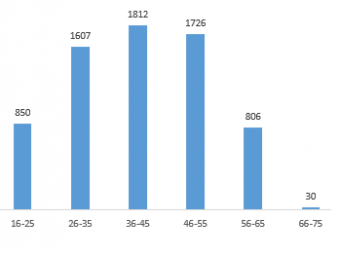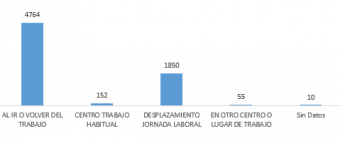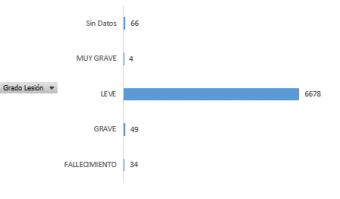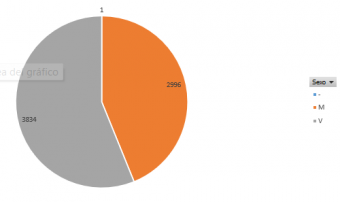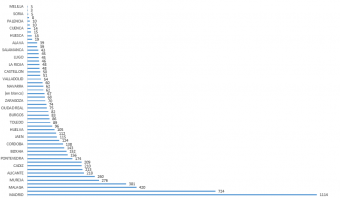
VIII Work Road Safety Week: we reinforce the commitment to sustainable mobility
Around the World Day of Remembrance for Traffic Accident Victims, which this year was celebrated on November 16, Fraternidad-Muprespa has once again celebrated its Workplace Road Safety Week, an occasion to raise awareness of the importance of reducing accidents in this area. In this eighth edition the motto was "Safe driving, sustainable mobility."
The abundant audiovisual content created for this week has been shared on social networks, grouping them with the hashtag #FMSemanaSVL, and on the screens of the Mutua centers.
Mar Morales, director of the Prevention and Health Culture department at Fraternidad-Muprespa, opened the webinar session on the 12th, “Safe and sustainable mobility: from plan to action”, moderated by David Revillo, prevention consultant at Fraternidad-Muprespa.
Óscar Fuertes, CEO of INFOVA Automotion and founding partner of Champions for Safety; Javier Gómez, deputy director of Planning and Contracting at Correos, a Fraternidad-Muprespa mutual company; and Carmen Ferreró, head of Communication and Sustainability at Arval BNP Paribas, shared good practices from their companies, described how they use technology and talked about how leadership generates a preventive culture.
The day closed Natalia Fernández Fundación Personas y Empresas - AUREN4, Deputy Director General of Prevention, Quality and Communication of Fraternidad-Muprespa, who recalled the value of alliances between administrations, companies and organizations, in line with SDG 17. “Safety is not imposed, it is trained and spread,” she noted.
At the headquarters of the General Directorate of Traffic of Cantabria, and together with the Cantabrian Institute of Safety and Health (ICASST), Fraternidad-Muprespa organized an 'escape room' on November 11 whose purpose was to strengthen decision-making and teamwork, in the face of a false road accident, and to achieve the intervention of the rescue groups involved: Civil Guard, health workers, firefighters and civil personnel. The challenge was to save the 'accident' in her "golden hour", an expression used to refer to the 60 minutes after an accident.
La Mutua was present at this important event organized by the Valencian Institute of Safety and Health at Work (INVASSAT). David Balmaseda, Prevention consultant for the Provincial Directorate of Valencia, presented the new immersive experience in occupational road safety.
The simulator proposes to the virtual driver real situations in urban and interurban circuits, with variables such as adverse weather, traffic, distractions and substance consumption.
Likewise, Jordi de Vicente, provincial director of the Mutua in Valencia, participated in the round table "Addictions at work."
On November 28, a new edition of Fratertalk will take place, with the title “Occupational road accidents: when the evidence speaks”, with the participation of the famous forensic judicial expert, Miryam Moya.
Data analysis to understand key accident patterns
To better understand the profile of road accidents in the work environment, Fraternidad-Muprespa shares its data relating to 2024, with key patterns for prevention, in total, 6,831 accidents with sick leave.
The territorial analysis reveals notable differences by province. Madrid leads the number of cases, 1,114, followed by Málaga (724), Murcia (420), Valencia (381) and Tarragona (276). At the opposite extreme, Melilla, Soria and Palencia with significantly lower figures, less than 10 cases.
Of the files analyzed, 56% correspond to men (3,834 cases) and 44% to women (2,996 cases), which reinforces the need to design prevention strategies adapted to each profile.
By age, the most affected groups are between 36 and 55 years, with a total of 3,538 cases. The 36 to 45 age group concentrates 1,812 files, closely followed by the 46 to 55 age group, with 1,726. That is, those who, due to their age, are in full professional activity are more exposed to road risks.
If the degree of injury is examined, 97.8% of the cases were minor (6,678 files). There were also 49 cases of serious injuries, 4 very serious and 34 deaths.
70% of the cases, 4,764, correspond to accidents that occurred while going to or returning from work, that is, they are itinere accidents, while 1,850 took place during the work day.
The days that concentrate the highest number of accidents are Mondays and Tuesdays, 1,338 and 1,373 cases respectively, followed by Wednesdays (1,238) and Thursdays (1,148), which suggests that the beginning of the work week is the time of greatest risk when traveling, possibly because there is more traffic, more fatigue or more pressure to resume activity.
Finally, automobiles represent 43.6% of the files (2,789 cases), followed by motorcycles, mopeds and scooters with 17.8% (1,141 cases). Light cargo or passenger vehicles account for 11.8% (755 cases), while bicycles and scooters account for 4.4% (283 cases). Vans and vans, as well as heavy vehicles, each account for 2.9% (186 cases respectively), and buses and coaches represent 2% (131 cases). Finally, two or three-wheeled vehicles, motorized or not, constitute 2% of the total (129 files).
